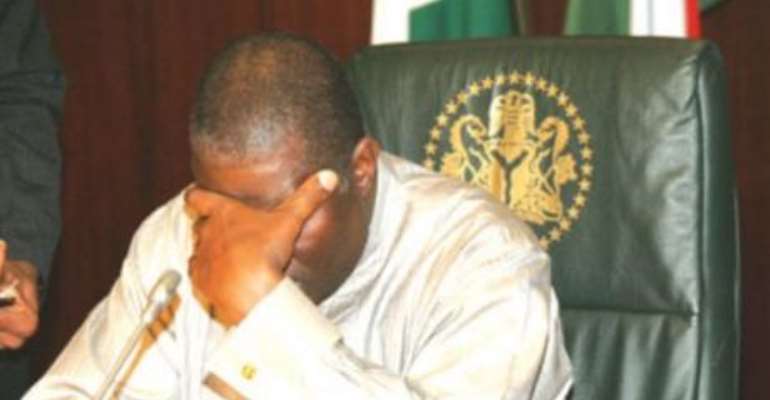TRANSPARENCY INT’L 2012 REPORT: TOGO, NIGER, MALI LESS CORRUPT THAN NIGERIA

In the ranking released yesterday by Transparency International on global corruption, Nigeria scored 27 out of a maximum 100 marks to clinch the 139th position out of the 176 countries surveyed for the report. Nigeria had placed 143rd in last year's ranking, making it the 37th most corrupt country.
The country shares the 35th position with Azerbaijan, Kenya, Nepal and Pakistan, while countries such as Togo, Mali, Niger and Benin fared better than Nigeria. Somalia, North Korea and Afghanistan, with a score of eight each, were listed as the most corrupt countries according to the report, while Denmark, Finland and New Zealand were the least corrupt with a score of 90 each.
This year's index ranks 176 countries/territories by their perceived levels of public sector corruption. The index draws on 13 surveys, covering expert assessments and surveys of business people.
The Corruption Perception Index is the leading indicator of public sector corruption, offering a yearly snapshot of the relative degree of corruption by ranking countries from all over the globe.
TI described this year's report as an indication that 'corruption is a major threat facing humanity. Corruption destroys lives and communities, and undermines countries and institutions. It generates popular anger that threatens to further destabilise societies and exacerbate violent conflicts.'
The organisation added, 'Corruption translates into human suffering, with poor families being extorted for bribes to see doctors or to get access to clean drinking water. It leads to failure in the delivery of basic services, like education or health care. It derails the building of essential infrastructure, as corrupt leaders skim funds.'
It, however, encouraged governments to integrate anti-corruption actions into all aspects of decision-making.
'They (governments) must prioritise better rules on lobbying and political financing, make public spending and contracting more transparent, and make public bodies more accountable,' it advised.
We are on the right track - FG
The presidency yesterday reacted to the corruption rating of Nigeria by TI, saying government was working hard to curb graft in the country.
Presidential aide Doyin Okupe, in a statement yesterday said: 'Transparency International rating is a perception index and no matter how hard you try to put in efforts, sometimes it is difficult for perceptions to change.
'Last year we were rated 143 and this year we have been rated 139th; what this means is that there is a four percent improvement to confirm that there has been concerted efforts by the Jonathan administration to battle corruption.
'We do not wish to join issues with Transparency International, but the reality is that, as posted by Transparency International, the country is making headway in the battle against corruption.'
Report in bad faith - Maku
In the same vein, the federal government also said that the latest report was a product of negative media reports.
Information minister, Mr. Labaran Maku, who made this comment while briefing State House correspondents after a nine-hour extraordinary Federal Executive Council (FEC) meeting, urged the media and Nigerians as a whole to project the country in good light to the world.
The minister said that apart from the TI rating of the country as the 37th most corrupt in the world, a recent Gallup Poll which also indicated that Nigeria was among corrupt nations in the world was also a product of interactions with Nigerians and negative media reports.
According to him, the anti-graft groups drew their conclusions from perceptions of both Nigerians and negative media reports because they (Nigerians and the media) have refused to appreciate that the Jonathan administration was taking steps to deal with corruption through systematic and institutional approaches that are yielding results gradually.
Citing instances of efforts made by government in tackling graft, Maku listed the prosecution of those implicated in the fuel subsidy fraud, investigation into the pension fund scandal, the geometric auditing of ministries, departments and agencies (MDAs) and the curbing of graft in the supply of fertiliser and seeds to farmers.
He noted that when the president attempted to curtail patronage in the oil and gas sector by introducing deregulation of the sector, Nigerians staged a wild protest which crippled activities in the country.
According to him, 'Government has continued to take decisive measures against defaulters in the fuel subsidy scam. There are so many issues involved in dealing with corruption. When you are systematic and deliberate, reform goes deeper.'
The information minister further remarked that combating corruption was not a job for the president alone.
'The president does not sit in court to imprison people. There are institutions set up to do that', he said, even as he urged journalists to follow up on institutional proceedings to get to the root of matters, thereby unearthing unwholesome omissions and commissions so that government will be able to track and act on such.
'If there are areas where things are not being done right, journalists should follow up. The federal government will continue to support all efforts to fight abuses,' he posited.
Admitting that the country has been bogged down by corruption for many years, Maku stated that the cankerworm cannot just be eradicated with the wave of the hand.
